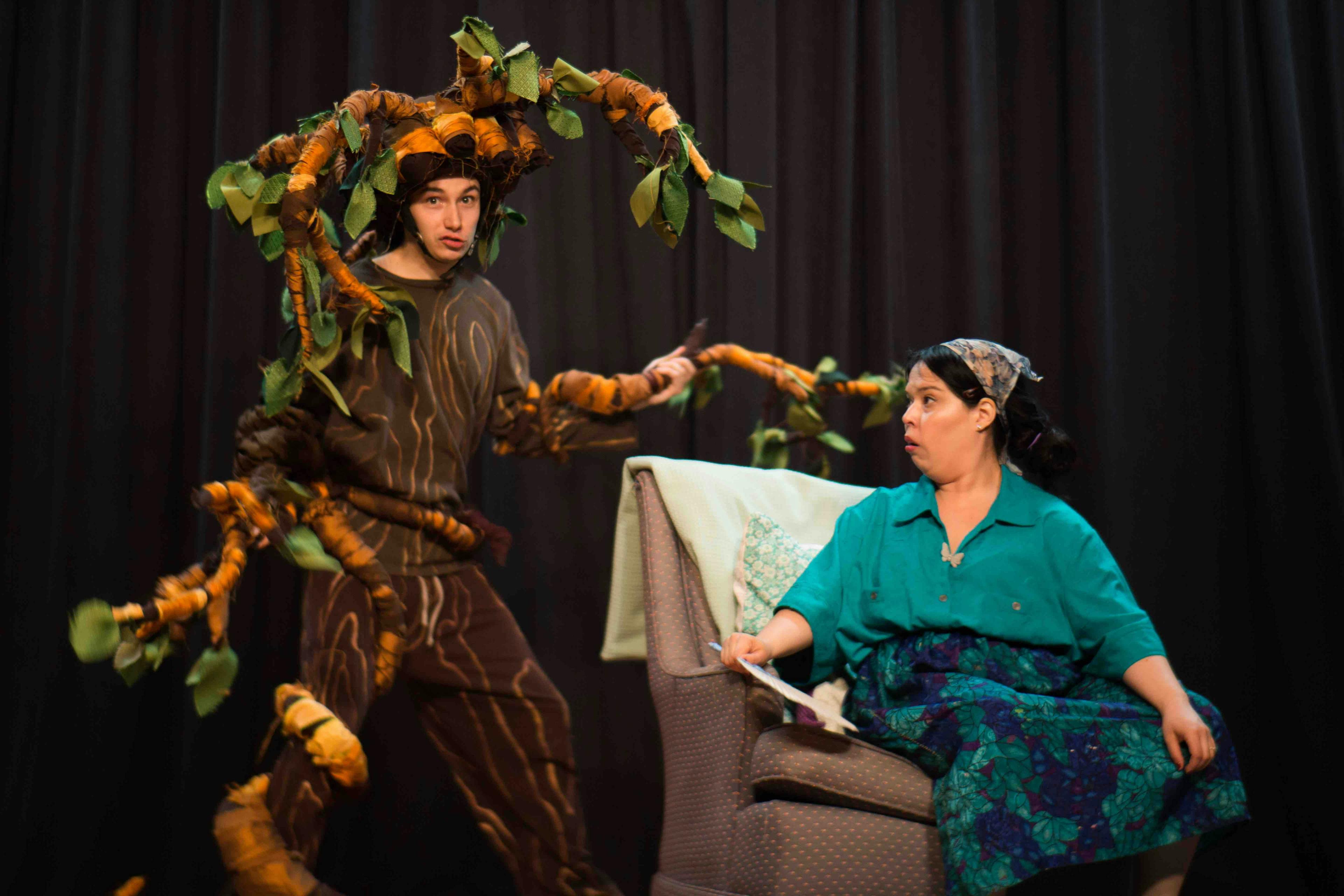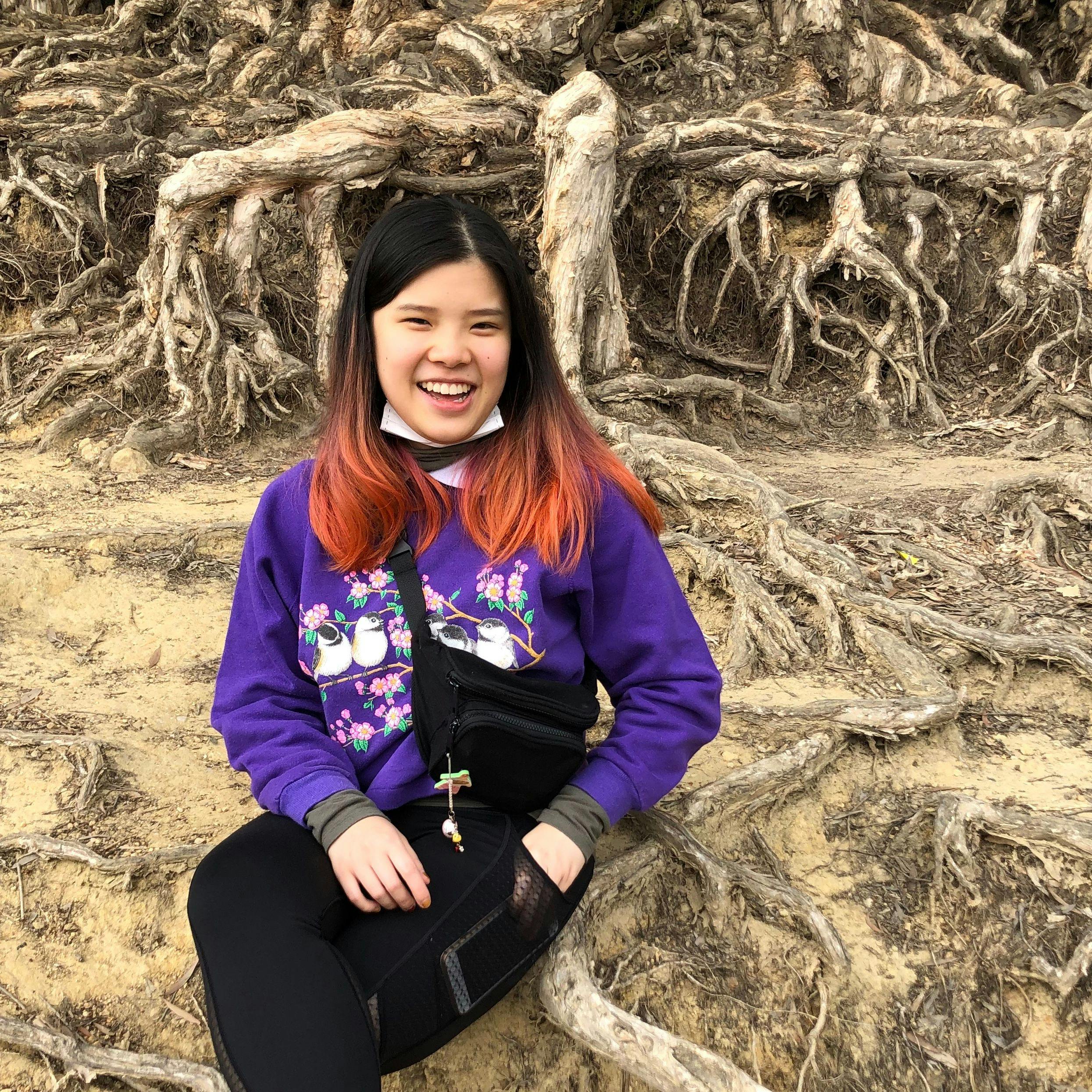V: Can I see the questions? I just want to get into that mental state [of plants] (laughs). I showed her my notes and she read the top line: How did you become interested in plants? She shut her eyes and slammed both of her hands onto the table and looked up to the ceiling. V: I love the first question. Before...I think I was very, “oh, I love plants.” I had this general love of plants. I always loved hiking and whatnot, but then ‘everyone’ likes hiking because it’s relaxing, right? But now I have this newfound awareness that...plants aren’t just beautiful. They’re very much alive.
As a recent graduate of Bachelor of Fine Arts (BFA) in Drama and Dramatics/Theatre Arts at New York University (NYU), Valerie Jane Kwok recounted to me how her personal interest in plants has developed into a greater concern for environmental issues over the past few years. In her final semester at NYU, she took a class named 'Anthropo(s)cenes', which involves evaluating how our current geological time period is centred around humans. She briefly showed me a folder of the readings on her iPad. I caught a glimpse of a few familiar names, including anthropologist Anna Tsing (2015), who explores afterlife and the relationship between capitalism and ecology through mushrooms. As someone with roots in anthropology myself, I could not help but smile with nostalgia.

Valerie revisited her budding interest in plants in her 'Reinventions of Love' course that "explores the theme of love from the beginning of recorded human history all the way to now." That is, from love in Biblical and biological narratives to love in the arts, including how music artist FKA Twigs sings about love in her songs. During the course she met a classmate who shared with her his deep interest in ecocritical theory, musing about how organisms process time differently and taking seriously the idea of love existing between plants. Ecocritical theory aims to promote an interdisciplinary approach to environmental thinking by drawing upon academic fields from science and geography to history and philosophy, whilst critiquing all of these sources (Glotfelty 1996; Cohen 2004). More specifically, ecocritics see many linguistic representations of the environment as "versions of [our] alienation from nature" (Glotfelty 1996: xxvii) and ask how "our metaphors of the land influence the way we treat it" (1996: xix).
Science loses in the modern world
V: When you think about the green slogan, the sole purpose is just, "oh hey, we're just going to plant trees...because we're losing this green colour."
In social science, an abundance of literature has highlighted how the Western cultural tendency for scientific evidence to always take precedence over other types of dialogue when talking about nature is having a negative effect on a global scale. For instance, Francesca Castagnetti (2019), co-founder of the Healing Earth Alliance (HEARTH), expresses her concern with the public's prioritisation of scientific jargon over more metaphorical descriptions, which leaves us "with a limited vocabulary to explain what we do not fully know or understand." However, my conversation with Valerie suggests that science is also losing to figurative language, particularly in the commercial world.
During her time in New York, Valerie started to see more beauty stores and grocery stores encouraging sustainable behaviour beyond the production side (e.g. having customers bring their own reusable containers to fill with extra virgin olive oil or liquid soap). But after moving back to Hong Kong, her hometown, she was reminded of the prevalence of capitalist culture by witnessing sustainability becoming entangled with monetary motivations in this space we call 'marketing'. If you browse a company webpage about eco-friendliness, what do you see? If you search for 'sustainability' or 'nature' in Google Images, what do you see? Green, green, the occasional blue, and probably more green.

Valerie's Anthropo(s)cenes professor recommended her a reading edited by environmental humanist Jeffrey Jerome Cohen (2013), titled 'Prismatic Ecology: Ecotheory beyond Green' - an anthology of essays exploring ecology in colours other than the stereotypical green, such as brown, ultraviolet, pink, and black (Clark 2015). She expressed, "I love the entire way that [book] does it, which is to flip [our assumptions] and imagine like, okay, what if we talked about nature as if it was violet black? So, we're talking about the deep ocean depths...our sun emits ultraviolet rays that even we can't see...there's also the invisible...there are particles in the air, there are cells [and insects] we can't see."
In a consumer culture world, businesses and NGOs mainly market sustainability using green because it is the most abundant colour in the ecosystems that we live in. However, marketing sustainability with a linguistic and visual aesthetic that is solely green can be dangerous. Literature and Environment Professor Cheryll Glotfelty (1996: xxvii) mentions, "linguistic and aesthetic categories condition the ways that we interact with nature." Ecocritics are not denying the predominance of green in our natural world, nor are they claiming that the public is ignorant of how it is made up of colours other than green. Still, the continuous use of such mono-aesthetic campaigns may cause us to forget about other crucial non-green parts of ecosystems, or even limit our sustainable actions to prioritise saving certain non-human organisms over others. As Valerie put it, "oh hey, we're just going to plant trees...because we're losing this green colour."
Eco-theatre: Where science meets art
V: [The problem with our fast-paced consumer culture is that] you get an ephemeral experience and then just throw it away completely...I didn't understand this until I went into my class but if you asked me where this table came from, where my desk came from, I can't tell you. If you asked me where the egg that I just ate at lunch came from, I have no idea.
Valerie made connections between her passion for storytelling with her burgeoning love for nature. Fictional stories (especially of nature) have gone from "big, epic narratives," such as Hindu epics, which give minor characters as much narrative weight as higher-status deities, to gradually shorter storylines that are restricted to one particular setting (modelled after Aristotle's idea of a climax and ending). In reality, many events are happening in different places at any given moment of time. Valerie claimed that, "we have shortened and condensed narratives for the sake of clarity...but at the cost of producing misconceptions about the natural world around us," and she feels that eco-theatre helps address this issue.
Superhero Clubhouse (n.d.) is an organisation that brings together artists and environmental experts (from both science and non-science fields) to unite ecology and theatre (eco-theatre), encouraging critical awareness of how "theatre can help shift consciousness in the face of global climate change." In the above video, plant biologist Stephanie Pearl elaborates that it is often "hard for individuals to relate and [to] care about climate change, since it's...this thing that we can't really see necessarily in day-to-day life. It's hard to feel necessarily the urgency until all of a sudden it's a massive problem, so I think theatre plays an important role in cultivating this emotional response."
Indeed, "we need to remind each other that poetry, storytelling, art and science need not be separate, and in fact work best together to build and transmit knowledge, especially when the process is communally shared" (Castagnetti 2019).
Does mother nature really need to be saved?
V: If the purpose [of 'going green'] is to save the world from detriment...[but] I don't know if the world is [actually] in detriment...the 2050 deadline...nothing else is saying that! [Us humans] are the only ones capable of even saying 2050, the words. The concept of 2050...like what the hell man.
Of course, despite knowing that it is impossible for us to ever have a complete database of the world, we strive to keep ourselves updated as much as possible. Still, we should not be addressing our environment as if we fully understand it. The science-versus-metaphor problem goes (at least) both ways. Yes, we are obsessed with the continuous arrival of new scientific findings. Yet ironically, we end up ignoring most of it in our everyday lives.
We need to start saving our relationship with nature, rather than saving nature itself. Valerie feels frustrated how current sustainability movements are "misleading people to think that ['saving' nature] is the end-goal," and that "we don't trust nature enough" to respond to human activity. Perhaps eco-theatre can help us realise that the conflict between scientists and artists does not necessarily occur in concept, but rather in conversation.
References
Buell, L. (2011) Ecocriticism: Some Emerging Trends. Qui Parle 19(2): 87-115. Castagnetti, F. (2019) Lost in Translation/Speaking the Language of the Land: The Quest for a New Environmental Narrative. The Ethnobotanical Assembly. Available online at: [accessed 31 July 2019]. Clark, T. (2015) Prismatic Ecology: Ecotheory beyond Green (Book Review). Green Letters: Studies in Ecocriticism 19(1): 103-105. Cohen, J. J. (2013) Prismatic Ecology: Ecotheory beyond Green. Minneapolis: University of Minnesota. Cohen, M. P. (2004) Blues in the Green: Ecocriticism under Critique. Environmental History 9(1): 9-36. Glotfelty, C. (1996) Introduction: Literary Studies in an Age of Environmental Crisis. In: Glotfelty, C., and Fromm, H. (eds.) The Ecocriticism Reader: Landmarks in Literary Ecology. Georgia: The University of Georgia Press, xv-xxxvii. Superhero Clubhouse (n. d.) What Is Ecotheater? Superhero Clubhouse. Available online at: [accessed 5 August 2019]. Tsing, A. L. (2015) The Mushroom at the End of the World: On the Possibility of Life in Capitalist Ruins. Princeton: Princeton University Press.

